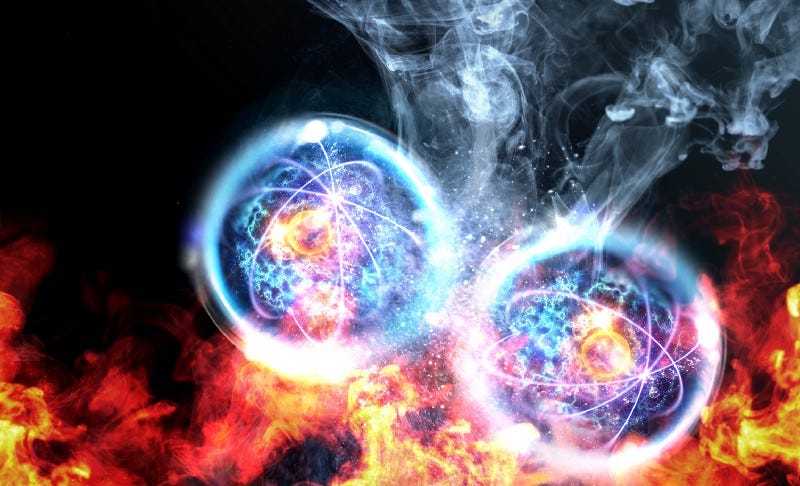Understanding Quantum Mechanics: A Simplified Guide to the Basics
Written on
Chapter 1: Introduction to Quantum Mechanics
Quantum mechanics is a challenging yet captivating field, but this straightforward guide will have you thinking like a physicist in no time.

Image by Ezume Images on Adobe Stock, Creative Commons
In the 2020s, "quantum" has become a prominent term in scientific discussions. Articles from credible sources often delve into space or theoretical physics breakthroughs that only a tiny fraction of the population can grasp. Yet, the quantum world is one of the most intriguing scientific topics today.
Starting your journey into this domain may be simpler than you imagine; enlightenment begins here. The quantum realm is peculiar and enigmatic, where the rules established by Albert Einstein’s classical physics become less certain. Essentially, it is a domain where particles can simultaneously exist in various states or locations, objects can be "entangled" across seemingly infinite distances, and even the act of observation can change how something behaves.
Does it sound like a plot from Battlestar Galactica?
Within the quantum realm, reality appears fluid and uncertain. Particles can seemingly emerge and vanish in an instant, energy can be temporarily borrowed and returned almost immediately, and time itself appears to warp and stretch.
Despite its chaotic facade, the quantum realm is also characterized by remarkable order, elegance, and precision. Scientists can leverage the power of atoms and subatomic particles to develop groundbreaking technologies, including transistors, lasers, and advanced quantum computers.
There remain many enigmas and secrets within the quantum realm that await discovery. This captivating area continues to draw the attention of scientists striving to unravel its complex and elusive nature.
What Does "Quantum" Mean?
The term "quantum" signifies the smallest indivisible unit or quantity of something. In physics, it is frequently utilized to describe the behavior of particles and energy at atomic and subatomic scales.
In quantum mechanics, "quantum" refers to the fundamental unit of energy tied to a particle's motion or state. For instance, an electron's energy in an atom is quantized, meaning it can only exist at specific energy levels and not in between.
Understanding quantization is crucial in quantum mechanics as it helps explain why phenomena like atomic and molecular spectra can be observed only in distinct (rather than continuous) increments.
This concept can be likened to a chef meticulously measuring ingredients for a recipe. Just as a chef must consider the precise quantities of each component to create a delightful dish, physicists use quantization to analyze and comprehend the behavior of particles and forces in the universe.
Similar to how a chef might adjust ingredient measurements based on the desired outcome, physicists may apply varying levels of quantization to different systems to accurately predict their behavior. Ultimately, both the chef and the physicist aim for a precise understanding of their respective fields, be it in the kitchen or the laboratory.
Quantum Mechanics Fundamentals
Quantum mechanics is a fascinating and occasionally puzzling area of physics that addresses the behavior of matter and energy at the quantum, or atomic and subatomic, levels. It is grounded in the principles of wave-particle duality, which posits that particles can demonstrate both wave-like and particle-like properties based on observation.
One iconic thought experiment in quantum mechanics is the "double-slit experiment," which illustrates the wave-particle duality of particles. In this experiment, a beam of particles is directed at a screen with two slits. When the particles pass through the slits, they generate an interference pattern on a detector screen behind the slits, similar to how waves create interference patterns when passing through two openings.
This experiment effectively showcases the concept of superposition, which states that a particle can exist in multiple states or locations simultaneously. During the double-slit experiment, the particles passing through the slits are in a superposition of both slits at once, and it is only upon observation that they "collapse" into a single state or location.
Another key concept in quantum mechanics is entanglement, where two particles are interconnected in such a manner that their properties are linked, regardless of the distance separating them. Consequently, if one particle is observed or measured, the other will instantaneously adopt a corresponding state, irrespective of how far apart they are.
Beyond its practical implications, quantum mechanics has significantly influenced our understanding of reality's fundamental nature.
In Summary:
The bizarre and counterintuitive predictions of quantum mechanics, such as superposition and entanglement, challenge our conventional notions of cause and effect, prompting profound philosophical inquiries about the universe's nature—questions that may remain unresolved for centuries.
However, with ongoing scientific endeavors in the quantum realm accelerating at an unprecedented rate, we are well on our way to uncovering the true essence of the universe.
If you found this article helpful, consider signing up for Medium Premium. For just $5 a month, you’ll gain unlimited access to all content on Medium while supporting independent journalism—like ours!
Chapter 2: Engaging with Quantum Concepts
In this video, "Quantum Mechanics for Dummies," viewers will be introduced to the fundamental principles of quantum mechanics in an easy-to-understand format.
The video titled "Quantum Physics for Dummies (A Quick Crash Course!)" offers a concise overview of essential quantum physics concepts, perfect for beginners looking to familiarize themselves with the subject.